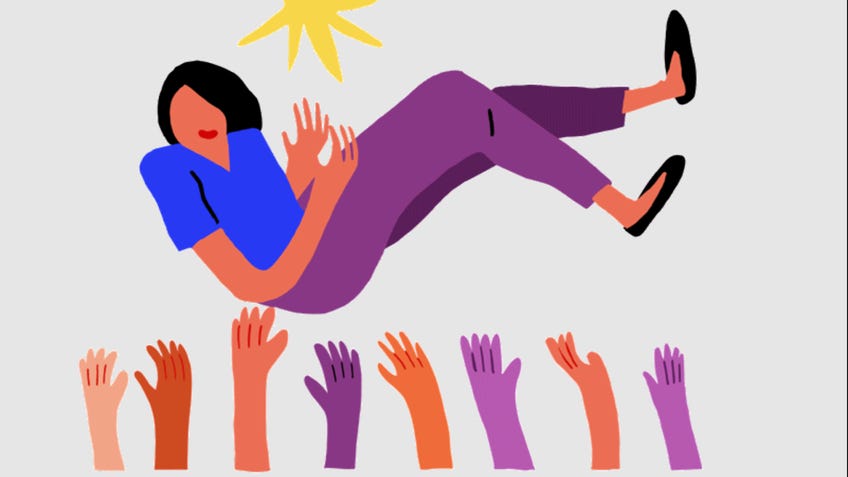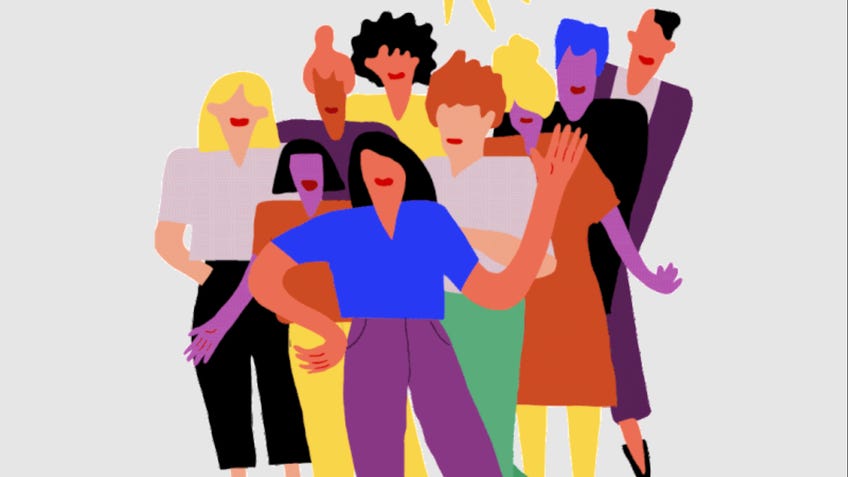BackerKit discusses challenging the 'big green K' as it moves from crowdfunding tool to competitor
From background support to leading player in crowdsourced financing.
Around this time last year, the tabletop industry was scrambling for alternative crowdfunding homes after Kickstarter announced vague yet ominous plans to invest in blockchain technology as part of the platform’s future. Six months later, BackerKit announced it would be joining the burgeoning space with a crowdfunding marketplace of its own.
BackerKit started as a supplemental toolbox for Kickstarter, filling frustrating gaps in the user and creator experience with payment processing, audience communication and logistical support, along with building a fairly sterling reputation with their customers. A decade later, and the small team is staffing up ahead of an official launch in early 2023 coinciding with the just-announced Gloomhaven RPG.
At PAX Unplugged 2022, Dicebreaker spoke with three of the people leading the transition into this new phase; co-founder Maxwell Salzberg, senior community manager Jason Furie and tabletop account manager Anya Combs. They expressed confidence in a brighter future that embraces small creators but doesn’t necessarily shut the door on tabletop’s biggest publishers.
How long have you been considering BackerKit’s transition into a crowdfunding platform?
Maxwell Salzberg: BackerKit will have its ten-year anniversary in January, and, to be honest, it was maybe three or four months before the announcement that we decided. Certainly, my partner Rosanna [Yau] and I didn’t start BackerKit thinking we would end up here.
Maybe I was the last person on Earth to realise what we were doing. A lot of my customers said, ‘I rely on this to make my business. This is my audience. I'm worried that [Kickstarter] doesn’t have my interests at heart. Will you build this thing?’ I kind of felt like we got drafted to run for president after saying we would never run for so long.
You're going on a journey with this creator which is so much more than ‘pay 50 bucks for some stuff’.
So, how’s the presidential campaign going?
MS: It's going awesome. The way we're building this is very much alongside a lot of the customers that we've had really long relationships with. What we have right now isn't our end goal - this is about just getting things up. We've been trying to launch two projects a week, just enough for our sort of skunkworks product team. 2023 will be really exciting because that's when we really are going to start accelerating.
Are you staying open to customer feedback during all this early shipping?
MS: That's our company’s core competency. Not to throw corporate words at you, but BackerKit is actually about us trying to proselytise helping creators stand on the shoulders of giants - all the creators that have come before them.
The metaphor I use is that we built a big patchwork quilt, and there's one green square in the centre. Finishing the quilt was this year, and replacing the green square will happen at the beginning of next year. But once we have all the squares, it's about: what do we want crowdfunding to be? Who do we think it should be for? What can it really do? Crowdfunding has become so much more than Kickstarter initially imagined, and we believe creators deserve something that reflects the awesome things they have made.

How has the community reacted to your announced plans?
Jason Furie: I'm on the frontlines with these folks every day, and it's been overwhelmingly positive. If there are multiple options out there, it's like gas stations next to each other. They're going to start to compete, and they're going to do cool, innovative things on both sides. That's all in service to the Creator.
Anya, what are you hearing from creators regarding BackerKit’s plans?
Anya Combs: Overwhelmingly, people have been excited. I have the very unique perspective of being on the frontlines of creators being very upset at Kickstarter. Some of it is deserved, and quite frankly, some of it isn't. I think there's some really valid questions that people are bringing up that we're answering in real time.
A little bit of healthy competition to create innovation is super, super good. That has been what people are more excited about than anything else - what are they going to do that's different? What's happening? What platform is the best for me instead of only having one option.
the future of community building, not just for our company but anybody out on this floor, is the power of the small community.
What are some of those tough questions you say BackerKit is answering in real time?
AC: There's this perception that there's this giant audience on Kickstarter. Some of that was really dialled down to the creator being the one who brings in the audience. Creators don't realise that their audience is going to follow them, whether it’s Elon Musk's cursed bird app, Facebook or TikTok. If your audience likes what you're doing, they're going to follow you.
You are now part of a really incredible creator community that exists on BackerKit, and everybody is here to support each other. Stuff like, ‘My friend is launching a project. How do I get my friend to be as successful as I am?’
How does a creator do that? Audience retention is a major concern for independent and smaller creators. If they decide somewhere else is a better fit for one of their projects, will BackerKit allow that audience to follow them?
JF: It's really about empowering the specific creators to set themselves up for success and build their own foundations. What if we’re not here tomorrow? They will be in the dark again, and they will have to start all over. It's super important for them to be the owners of their destiny to a degree. Empowering them to identify and build a foundation, themselves? They'll be unstoppable if they do it right.
Some of our customers were saying the big green K isn’t the best place to grow their business, and we want to follow that problem.
AC: Some of this is not a crowdfunding issue - it’s just an art issue. If you're an artist, putting your work out into the world is already an incredibly terrifying thing to do. Crowdfunding forces creators to be even more vulnerable because there's direct access to their audience, to their community. That is a challenge that is… I don't want to say unsolvable, but it does require an extreme level of communication and ability to emotionally regulate.
Are you discussing different crowdfunding models that might better suit smaller creators, e.g. slowfunding (gradual pre-orders with no end date), variable campaign lengths, etc?
MS: Yeah, definitely. Normally, crowdfunding is pretty sleepy in January, so we’re doing this thing called Pintopia. 25 pin creators are all launching seven-day campaigns at the same time, but it’s actually a campaign of campaigns. There are goals for the aggregate of all the campaign's succeeding, the backers are gonna get other fun stuff and there's going to be a bunch of weird cross collabs.
It’s multiplayer crowdfunding. The reason why crowdfunding works is because there are other people creating alongside you, but that's normally hidden in the background.

JF: The goal here is less about making tons of money on a single project and more about getting a single backer to back multiple projects, while also doing a cohort-style resource sharing. You have a mix of people who've done it 10 times with someone who's never done it, and we're putting them together in the same room so they can help each other figure it out.
What if crowdfunding becomes no longer the best option for creators? Will it always be the centre of BackerKit’s business model?
MS: We’ve always said we’re in the business of solving creator problems - it just happened to be they were on crowdfunding. This is the exact reason why we're doing crowdfunding to begin with: some of our customers were saying the big green K isn’t the best place to grow their business, and we want to follow that problem.
If you're an artist, putting your work out into the world is already an incredibly terrifying thing to do.
That’s one side of the answer. The other is that we're excited to possibly redefine what crowdfunding even means. There's some truth and knowledge in the current constrained definition, but if you zoom out past PAX and tabletop most people don’t know what crowdfunding really is, and I think that’s a shame.
You say you’re excited about ‘redefining crowdfunding’, but what does that materially look like?
MS: Small niches can be powerful. A good way to grow even a small niche is to actually focus on it even deeper. Critical Role and Gloomhaven are wonderful narratives, but I think it more comes down to doing right by the people who love your stuff. I love the idea that an idea can start small. It doesn't need to shoot for the moon immediately.
JF: A common misconception I see a lot is people thinking that they have to appeal broad to be successful. To me, the future of community building, not just for our company but anybody out on this floor, is the power of the small community.
We joke about crowdfunding creator match services. A lot of creators think ‘I don't want to launch at the same time as this other project. That's too dangerous, they're gonna get all the money.’ I think our theory is more like rising tide.
What’s your opinion of FOMO (fear of missing out) as a cultural force in crowdfunding?
MS: Obviously, it's a powerful force. You're familiar with the classic Kickstarter graph, the big, scoopy ‘U’. There's really only two types of backers: there are the people who just want to be first and will bust down the Walmart doors whether you incentivise them or not, and there are the people who will wait until the last possible moment.
JF: FOMO in general tends to disappoint people, especially when exclusives are involved, but I don't know how we can think about that from a campaign window kind of thing.
BackerKit is about us trying to proselytise helping creators stand on the shoulders of giants - all the creators that have come before them.
AC: I think the pandemic pushed crowdfunding into a place where we were so stuck at home that FOMO took on a little bit of a super challenging head. [At Kickstarter], we could not believe what was really happening. It was, quite frankly, scary because we knew this was going to explode. What is that going to look like for people's careers?
What I have seen is a little bit more of a mindful approach to what crowdfunding looks like from a macro perspective. I don't know if that's necessarily the responsibility of platform holders alone but also creators. None of us want to be Amazon. We don’t want to create that environment. So, it is so much about having those open lines of communication because FOMO will happen no matter what.
MS: Creators spend the most time working on their project during the middle of that scoop because they're like, ‘Why is nobody backing my project?’ We need to make the project itself an experience that people want to participate in. You're going on a journey with this creator which is so much more than ‘pay 50 bucks for some stuff’.
This interview has been edited for clarity and length.



